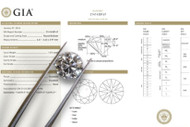Aug 30th 2021
What You Should Know About Diamond Certifications
If you’re scouting for an engagement ring for that special someone, you’ve probably heard the term “diamond certification” a few times. Not sure what that is or how it applies to the rings you’re eyeing? We’re here to help you understand!
What is a Diamond Certificate?
Also known as a diamond report or diamond dossier, a diamond certificate is a document that details the stone’s important features, such as color and clarity, that you should consider before buying. The report is provided by an accredited, third-party laboratory, where professional gemologists inspect and measure the diamonds with special tools.
It’s important to note that each laboratory evaluates diamonds differently due to different standards. So, you could see significant differences across various certificates. To minimize confusion, we recommend choosing a diamond graded by a highly credible institution.
What are the Different Types of Diamond Certifications?
GIA (Gemological Institute of America): GIA is the most trusted and consistent source for evaluating diamonds, even colored ones, that weigh 0.15 carats or more. In the 1950s, this institution established the 4 C’s (aka color, clarity, cut and carat weight of a diamond) and the International Diamond Grading System, which is still considered the industry standard for determining diamond quality.
In a GIA certificate, you can find information on the stone’s 4 C’s, shape, symmetry, girdle thickness and many other qualities. It even contains diagrams of the stone’s proportions and imperfections. GIA is known for evaluating a diamond’s color and clarity more closely, as these characteristics are more subjective.
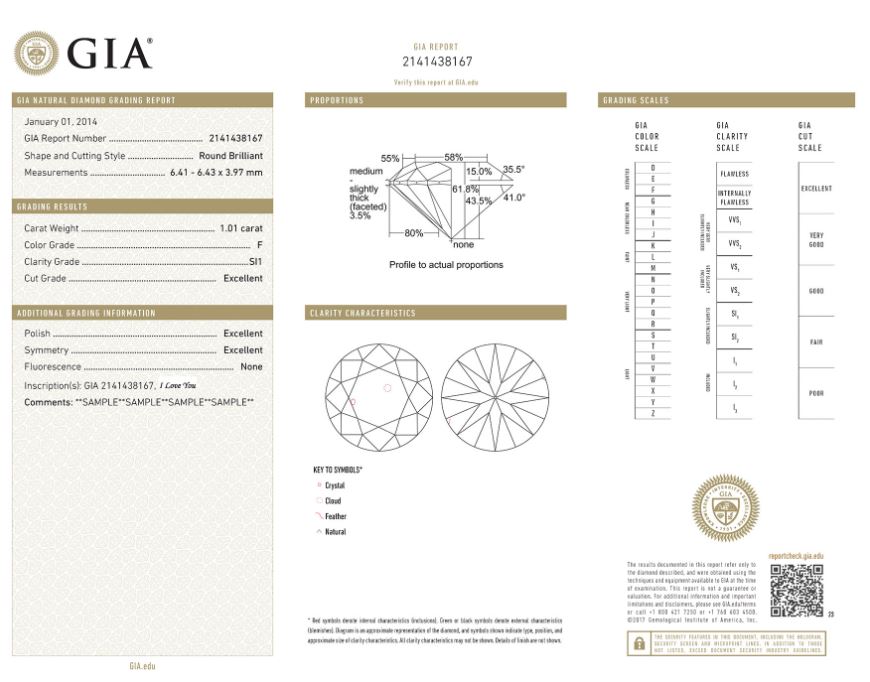
AGS (American Gem Society): Similar to GIA, AGS is another go-to diamond grading source, particularly for retailers selling round cut diamonds. The association was started in the 1930s by a small group of jewelers in an effort to safeguard the public from fraud and false advertising when buying jewelry.
AGS evaluates diamonds slightly differently than industry standards. A stone’s cut, color and clarity are ranked from 0-10, with 0 being the highest rating (aka “ideal”). Back in AGS’ early days, jewelers reportedly couldn’t refer to a diamond as “ideal” unless its accompanying AGS certificate confirmed the claim.
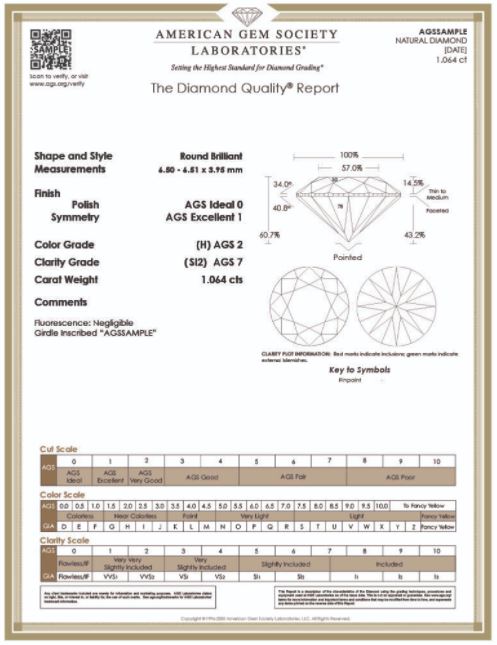
IGI (International Gemological Institute): With 18 laboratory locations worldwide, IGI is the largest organization for grading diamonds, gemstones and finished jewelry. In 2005, it became the first institution of its kind to begin fully ranking lab-grown diamonds. Major jewelry chains in the U.S. and Canada reportedly gravitated to IGI’s certifications. However, its ratings tend to be less consistent than other diamond grading organizations.
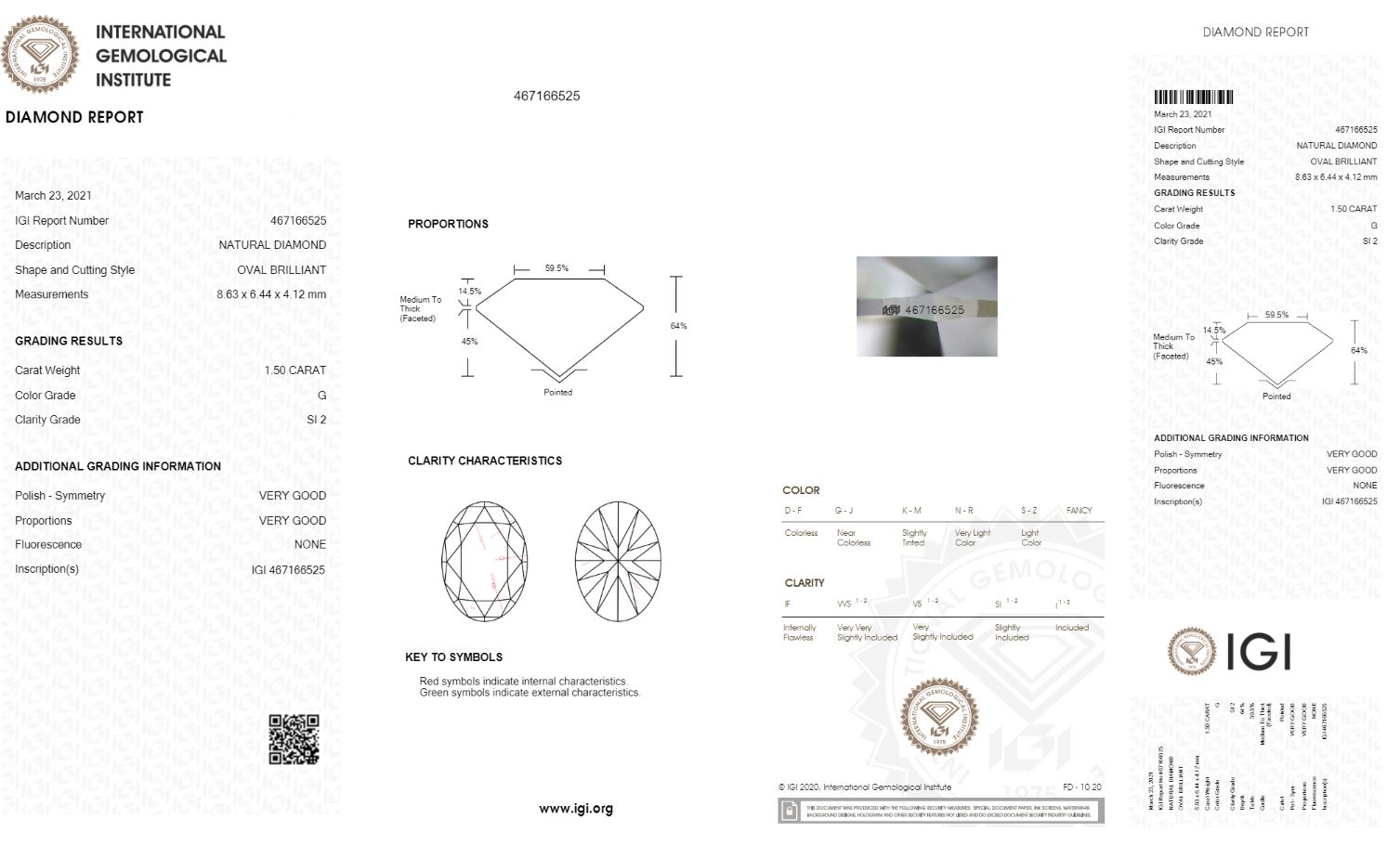
EGL USA (EGL USA Gemological Laboratory): EGL USA has been evaluating diamonds since the 1970s and was reportedly one of the first laboratories to grade diamonds weighing less than one carat. Similar to the GIA grading standards, the EGL USA Diamond Report includes classic criteria of carat weight, clarity grade, color grade, cut (shape and style), finish, fluorescence, plotting, and proportions.
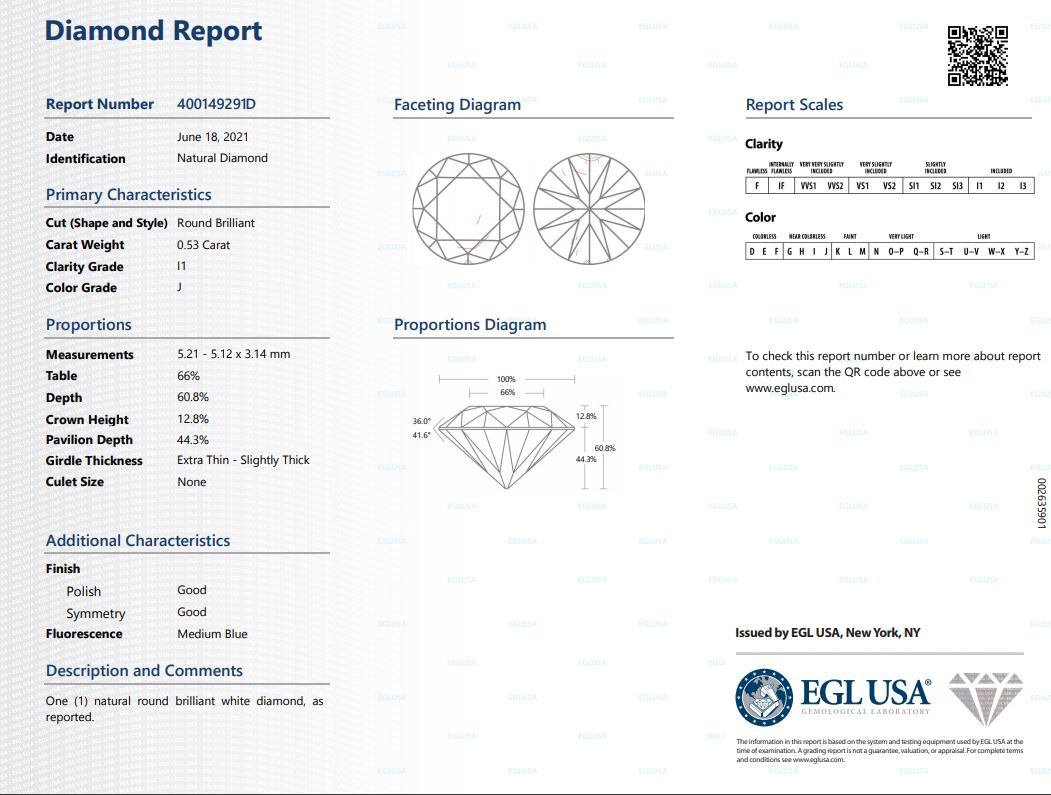
Others: You may come across a couple of other certifications, such as HRD (Hoge Raad voor Diamant) and GSI (Gemological Science International). GSI is a newer grading institution that has emerged in the past few years. HRD is a European-based laboratory but often isn’t considered a reliable alternative in the U.S.
Most Notable Characteristics in a Diamond Certificate
What are the most important aspects of a diamond certificate? First, pay attention to the 4 C’s (a diamond’s color, clarity, cut and carat weight), which serve as the basis of GIA’s international Diamond Grading System. Of those four characteristics, the cut is considered a diamond’s most important feature. So, keep that in mind! You’ll also want to pick a stone with few visible imperfections. Check out our guide on diamond clarity characteristics to get you started!
Benefits of a Certified Diamond
One huge benefit of selecting a certified diamond is reliability. An engagement ring is an important investment, and you’ll want to make sure that the quality of your diamond matches what the seller claims. You can also rest easier knowing that the stone has been inspected by a professional gemologist.
Another perk: If you’re considering a few rings, it’s easier to compare diamond certificates vs. what you’re seeing with the naked eye. But as we mentioned earlier, remember that certificates might not exactly match up, as laboratories have different grading standards!
Certified diamonds also have a higher value. If you already purchased a diamond and aren’t completely satisfied, Gage Diamonds offers a lifetime diamond upgrade program for natural, GIA-graded diamonds.
How are Lab-Grown Diamonds Graded?
Lab-grown diamonds are actually graded just like natural diamonds! Professional gemologists use the same scales to measure a stone’s color, clarity, cut and carat weight. But only certain institutions, such as GIA, IGI and GCAL (Gem Certification & Assurance Lab), handle lab-grown diamonds.
We recommend getting your lab-grown diamond certificates from IGI, as they have been fully grading these stones and providing specific grades for color and clarity since 2005. Although GIA has been rating lab-grown diamonds since 2007, it only recently began offering full reports.
Are Moissanites Graded Like Diamonds?
Diamonds and moissanites are also evaluated on the same qualities, the 4 C’s, but there are notable differences in how they’re rated. For example, moissanites follow a different color grading scale and can fall into one of three categories: colorless (D-E-F range), near colorless (G-H-I range) and faint hues of color (J-K range). They also weigh less than diamonds, so you will often see “diamond equivalent weight” or DEW listed for comparison.
Is a Diamond Certificate the Same as an Appraisal?
These terms are often used interchangeably, but they have completely different meanings! While a certificate highlights all of a diamond’s features, an appraisal focuses on the stone’s value/price and is typically helpful in determining an amount for insurance. Since an appraisal can fluctuate every so often, we recommend re-appraising your diamond every two years.
Have a question? We can help!
Gage Diamonds is Chicago's premier jewelry showroom and online retailer of engagement rings, wedding bands, and fine jewelry. We offer a selection of dazzling handpicked diamonds, certified to ensure minimal inclusions and blemishes seen by the naked eye.
We’re committed to helping you find the ring of your dreams. For inspiration, browse our website or set up an appointment with a member of our trusted staff at our in-person showroom.
We offer no-credit-needed financing – feel free to apply and get your approval within 24 hours!
Pay over time, because love shouldn’t wait.
 VISIT OUR SHOWROOM
VISIT OUR SHOWROOM Reviews on Google!
Reviews on Google!

